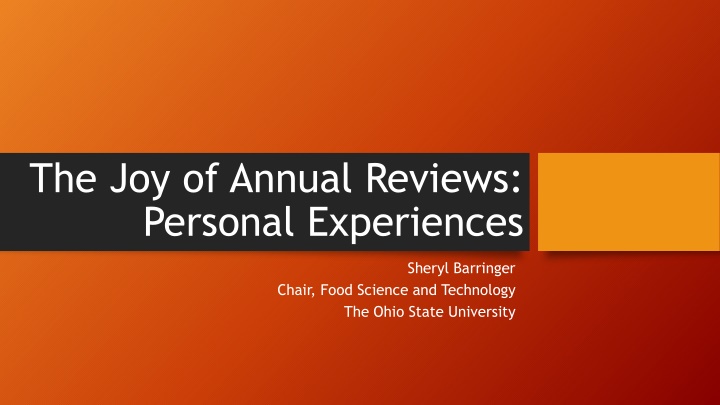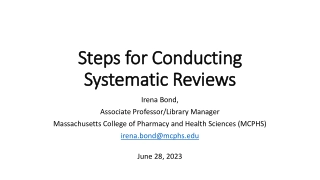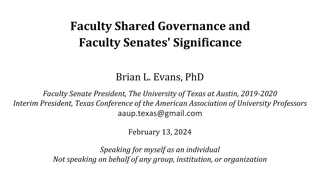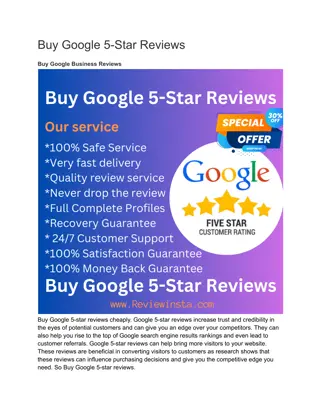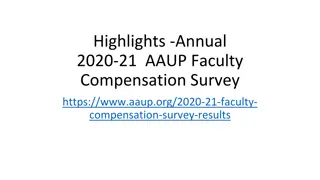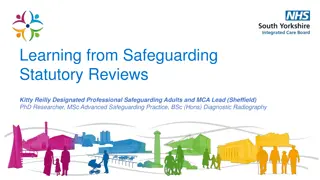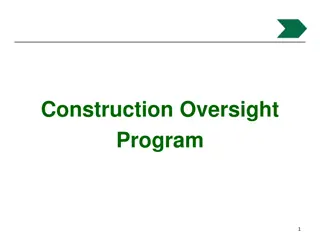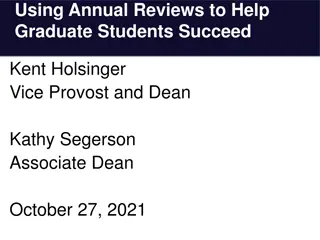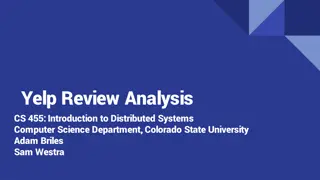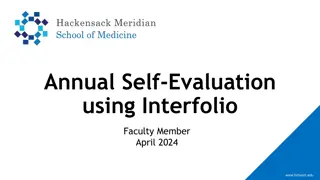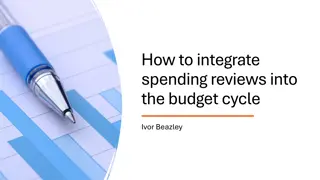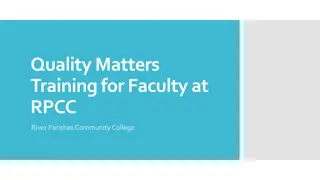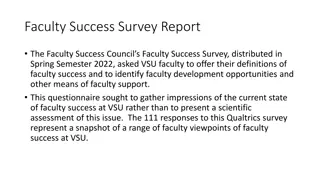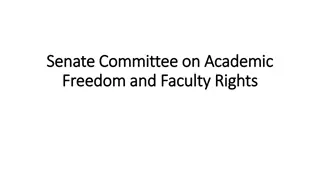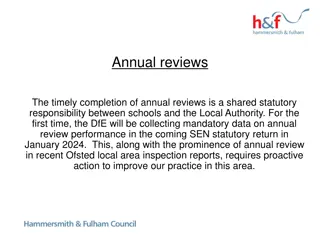Annual Review Strategies for Success
Explore the key strategies and personal experiences related to annual performance reviews, debunking myths and highlighting the true purpose behind them. Discover the importance of setting expectations, expressing gratitude, and emphasizing growth opportunities. Gain insights into structuring and conducting effective annual reviews to foster continuous improvement and strengthen professional relationships.
Download Presentation

Please find below an Image/Link to download the presentation.
The content on the website is provided AS IS for your information and personal use only. It may not be sold, licensed, or shared on other websites without obtaining consent from the author.If you encounter any issues during the download, it is possible that the publisher has removed the file from their server.
You are allowed to download the files provided on this website for personal or commercial use, subject to the condition that they are used lawfully. All files are the property of their respective owners.
The content on the website is provided AS IS for your information and personal use only. It may not be sold, licensed, or shared on other websites without obtaining consent from the author.
E N D
Presentation Transcript
The Joy of Annual Reviews: Personal Experiences Sheryl Barringer Chair, Food Science and Technology The Ohio State University
Some hidden keys to success Know the rules Thank people more often than you think you is necessary Set, document and enforce, expectations
There is very little evidence to suggest that annual performance appraisals are helpful* *Thistlewaite J. 2018. Empathic leadership: where to performance review? The Clinical Teacher 15: 443-444.
There is very little evidence to suggest that annual performance appraisals are helpful* *Thistlewaite J. 2018. Empathic leadership: where to performance review? The Clinical Teacher 15: 443-444. What is the purpose of the annual review?
Why do I do an Annual Review? Required by the University I learn so much! We solve problems together! Good things get better! Document expectations and performance when there are problems I would do them if they weren t required
Why I love annual reviews
Personal example of a structure: Email December 1 with annual review requirements Reminder early January Deadline (and consequences) for annual reviews in governance documents (January 31) Draft my letter determines the issues I do not show it to them HR reviews delicate language Email them with the PERSONALIZED agenda In person: questions, curious listening Written letter: edited after our meeting
My goals of the in-person meeting Learn what excites them How can I encourage that? Learn how to sell their research Reinforce positive behavior (ongoing) Identify solutions to problems (ongoing) Focus entirely on one person my university does not require this, but I wouldn t miss it
The top 10 factors for employee happiness: 1. Appreciation for your work 2. Good relationships with colleagues 3. Good work-life balance 4. Good relationships with superiors 5. Company's financial stability 6. Learning and career development 7. Job security 8. Attractive fixed salary 9. Interesting job content 10. Company values J Morgan. 2014. The top 10 factors for on- the-job employee happiness. Forbes.
The top 4 factors for employee happiness: 1. Appreciation for your work 2. Good relationships with colleagues 3. Good work-life balance 4. Good relationships with superiors J Morgan. 2014. The top 10 factors for on- the-job employee happiness. Forbes.
Standard types of agenda questions Tell me about yourself: What progress have you made on last year s short and long term goals? Future: What new goals have you set? Problems: What can the department do to make you more successful?
Identify my goal, then write the individualized question: Goal: Make them think Give one example of a colleague in the department who is working to make the department more successful. How? Give one example where you have done something to make the department more successful. Is there anything you would like to give up? What do you want your legacy to be? What steps are you taking to become the world s best teacher?
For each person, develop one goal, and formulate some questions Dr. Grant didn t write any grants last year, and research productivity is declining Dr. Consortia started a new research consortium Dr. Loud takes over meetings and doesn t listen to others Dr. Lead wants to be viewed as a leader by others Dr. Self believes their research has greater impact and real value than that of others in the department Dr. Bored appears bored and disconnected Dr. Service offers a lot of workshops for the public
Dealing with the challenges
Steps to deal with challenging personnel Know The Rules work with HR Read the Position Description Mainly for staff Correct your misconceptions Understand the expectations
Steps to deal with challenging personnel Set and Discuss expectations In person Email summarizing the meeting Provide tools/training Multiple times (trajectory) What does HR expect?
What are the expectations? Behavior Some university rules Faculty develop guidelines for behavior Group accountability to expectations Complaints must be reported to human resources Grants and publications Teaching Student evaluations Private exit interviews
Documentation Step 1 Document, Document, Document Private file Examples for your management file Emails Hand-written notes summarizing a meeting Private unless you quote it in a public location Key Point!
Documentation Step 2 Annual review letter summarizes your documentation Must be in the personnel file Have human resources or the legal department review the wording Do not meet expectations
Steps to deal with challenges - Staff Position Description Discuss expectations Provide Tools Annual review letter summarizes expections and not meeting expectations Know The Rules work with human resources What are your options? Performance Improvement Plan, Reduction in percent position, Elimination of the position
Steps to deal with challenges - Faculty Discuss expectations Provide tools Annual review letter Workforce Improvement Plan Multiple Annual Reviews State the potential for detenuring Show no raises
Productivity + Behavior = Performance Productivity is easy to measure Performance is what matters Behavior impacts students ability to learn, effectiveness in committees, ability to communicate your research .
Warning example Fair evaluation of their strengths (and weaknesses) Clear statement of the problem Problem has been reported Describe the actions (not labeling the person) Why the problem is important (to the department or personally) The required action Future consequences Retaliation statement
Fair evaluation of their strengths as noted above, you are a productive faculty member in our department. You are a strong teacher, have a successful Extension program and provide service to our College and our Department.
Clear problem statement, and reporting as noted above, you are a productive faculty member in our department. You are a strong teacher, have a successful Extension program and provide service to our College and our Department. However, I must call out your occasional inappropriate interaction with faculty and staff in our Department. This behavior has also been reported to Human Resources.
focus on actions not people; interpretation of events as noted above, you are a productive faculty member in our department. You are a strong teacher, have a successful Extension program and provide service to our College and our Department. However, I must call out your occasional inappropriate interaction with faculty and staff in our Department. This behavior has also been reported to Human Resources. This inappropriate behavior takes the form of losing your temper and actions towards others that are interpreted and reported as bullying.
Why this is important However, I must call out your occasional inappropriate interaction with faculty and staff in our Department. This behavior has also been reported to Human Resources. This inappropriate behavior takes the form of losing your temper and actions towards others that are interpreted and reported as bullying. This is not appropriate and hurts the professional and civil atmosphere of the workplace. Additionally, it impacts your ability to be productive and hinders the overall mission of the department and our commitment to mutual respect and responsible behavior.
Required action; future consequences However, I must call out your occasional inappropriate interaction with faculty and staff in our Department. This behavior has also been reported to Human Resources. This inappropriate behavior takes the form of losing your temper and actions towards others that are interpreted and reported as bullying. This is not appropriate and hurts the professional and civil atmosphere of the workplace. Additionally, it impacts your ability to be productive and hinders the overall mission of the department and our commitment to mutual respect and responsible behavior. It is important that you refrain from this behavior and failure to do so will result in additional action.
Retaliation statement This is not appropriate and hurts the professional and civil atmosphere of the workplace. Additionally, it impacts your ability to be productive and hinders the overall mission of the department and our commitment to mutual respect and responsible behavior. It is important that you refrain from this behavior and failure to do so will result in additional action. In addition, you must refrain from taking any physical or verbal action that may be interpreted as retaliatory in nature related to these concerns.
Case studies: What steps should you take? Dr. Rude frequently speaks rudely to other faculty members in department meetings, through emails and in person. These comments are not racist or sexist, but you have received complaints from both faculty and staff. Dr. Advisor: You frequently receive complaints from their graduate students, often accompanied by tears. The students feel that unreasonable demands are made on them. Dr. Advisor insists they have grants and need to get the research done. Dr. Tired has not written a grant or published a paper in years; however every year he offers a half dozen poorly attended workshops and answers some phone calls. Dr. Teach s student evaluations were never great, but are now falling. He insists students today just don t know how to work anymore.
